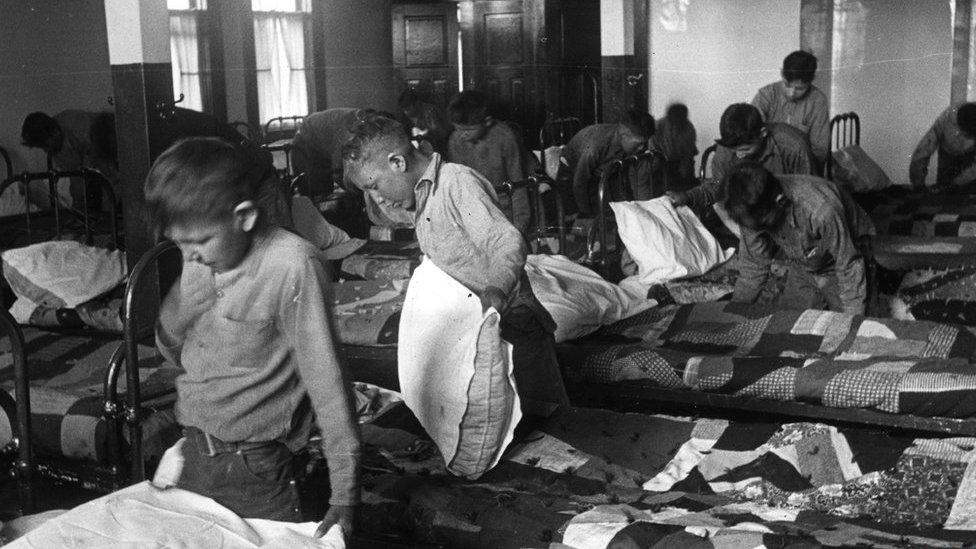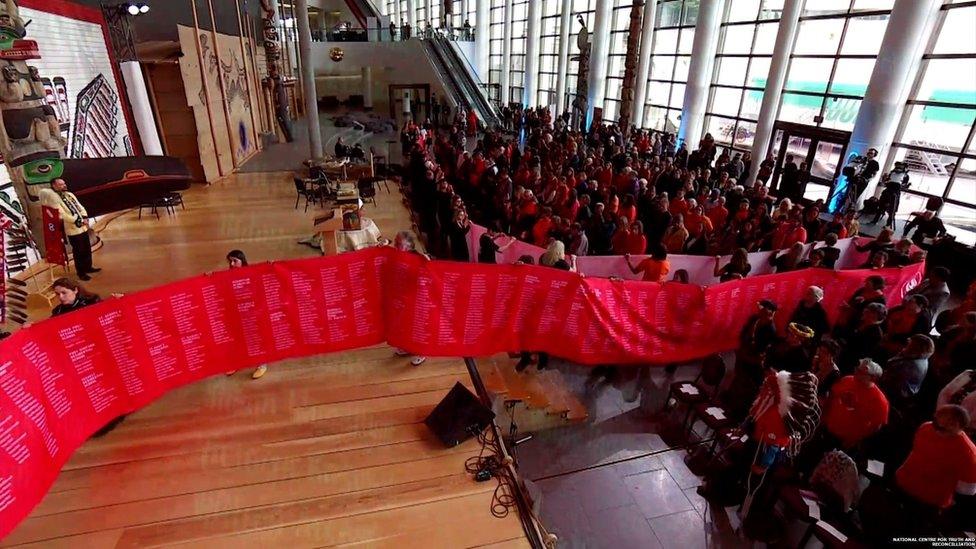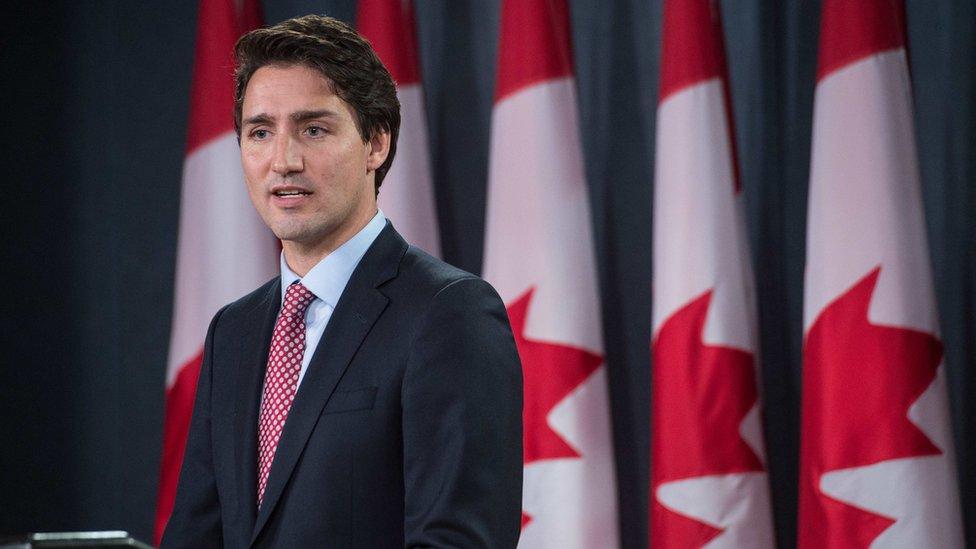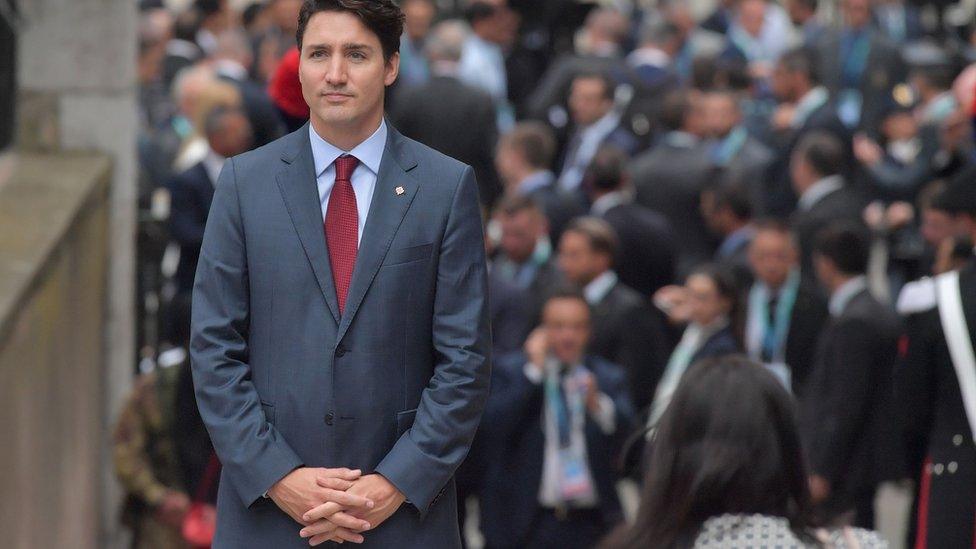Canada reveals names of 2,800 victims of residential schools
- Published

Indigenous children at a residential school in 1950
For more than a century, they were anonymous. But now the names of 2,800 indigenous children who died in Canadian residential schools will finally be known.
From Abel Evan Francois to Zotique Kahkikyas, one by one, the names of residential school victims were revealed in a powerful ceremony honouring "the children who never came home".
It took more than a decade for researchers to identify nearly 3,000 children who died in Canada's residential schools - compulsory boarding schools run by the government and religious authorities during the 19th and 20th Centuries with the aim of forcibly assimilating indigenous youth.
Many families were never notified, and the children were buried in unmarked graves.
"Children were taken away and put into these schools absent of love and care and affection. I think many of them probably passed away in quite lonely circumstances," says Ry Moran, the Centre's director.
But on Monday, their names were finally known, when the National Centre for Truth and Reconciliation, in partnership with Aboriginal People's Television Network, unveiled a national memorial register. All 2,800 names were inscribed on a red scroll, which stretched 50 metres (164 feet).
"Today is a special day not only for myself, but for thousands of others across the country. To finally bring recognition and honour to our school chums, to our cousins, to our nephews, to our nieces, that were forgotten," says Barney Williams, a residential school survivor and member of the Tla-o-qui-aht First Nations in Meares Island, British Columbia.

Volunteers unfurl a scroll inscribed with the names of 2,800 victims of Canada's residential schools
"We're ensuring that people know these kids. Know that when we talk about the children who never came home from these schools, they were real children with real names who came from real communities with real families. This makes the gravity of what we're dealing with, as a country, all the more real," says Mr Moran.
The Centre now hopes to collect the stories behind the names on the register.
"We're taking an important step to make sure the children who never returned home from those schools were honoured, celebrated and most importantly loved," he says.
What were residential schools?
From about 1863 to 1998, more than 150,000 indigenous children were taken from their families and placed in state-run boarding schools.
The children were often not allowed to speak their language or to practise their culture, and many were mistreated and abused.
The landmark Truth and Reconciliation report, released in 2015, said the policy amounted to "cultural genocide".
Since 2007, the Canadian government has settled with thousands of living survivors, paying more than C$3bn ($2.3bn, £1.8bn) in what is considered the largest class-action settlement in Canadian history.
In recent years, the Canadian government has made reconciliation with indigenous people a priority.
Monday's memorial for the students who never returned is one of many ways that governments and institutions are trying fulfil the recommendations listed in the Truth and Reconciliation Commission's report.
Beth Greenhorn on connecting families with archive photos
What else happened on Monday?
Also on Monday, in Val d'Or, Quebec, the provincial government released the Viens Inquiry, external, named for retired Superior Court justice Jacques Viens who was tasked with investigating how provincial police, laws, policies and institutions discriminate against indigenous people.
The inquiry was commissioned in 2016 after several women in Val d'Or came forward with allegations of sexual abuse by local police. Authorities said they believed the women but did not have enough evidence to lay charges.
The 520-page report found that indigenous people in Quebec are victims of "systemic discrimination" in accessing public services.
It urged the government to issue a public apology.
"Thousands of people are being robbed of their dignity because they are being kept in deplorable living conditions, at the margins of their own cultural referents. In a developed society like ours, this is simply unacceptable," Mr Viens said in his address.
- Published24 November 2017

- Published27 May 2017

- Published18 November 2016